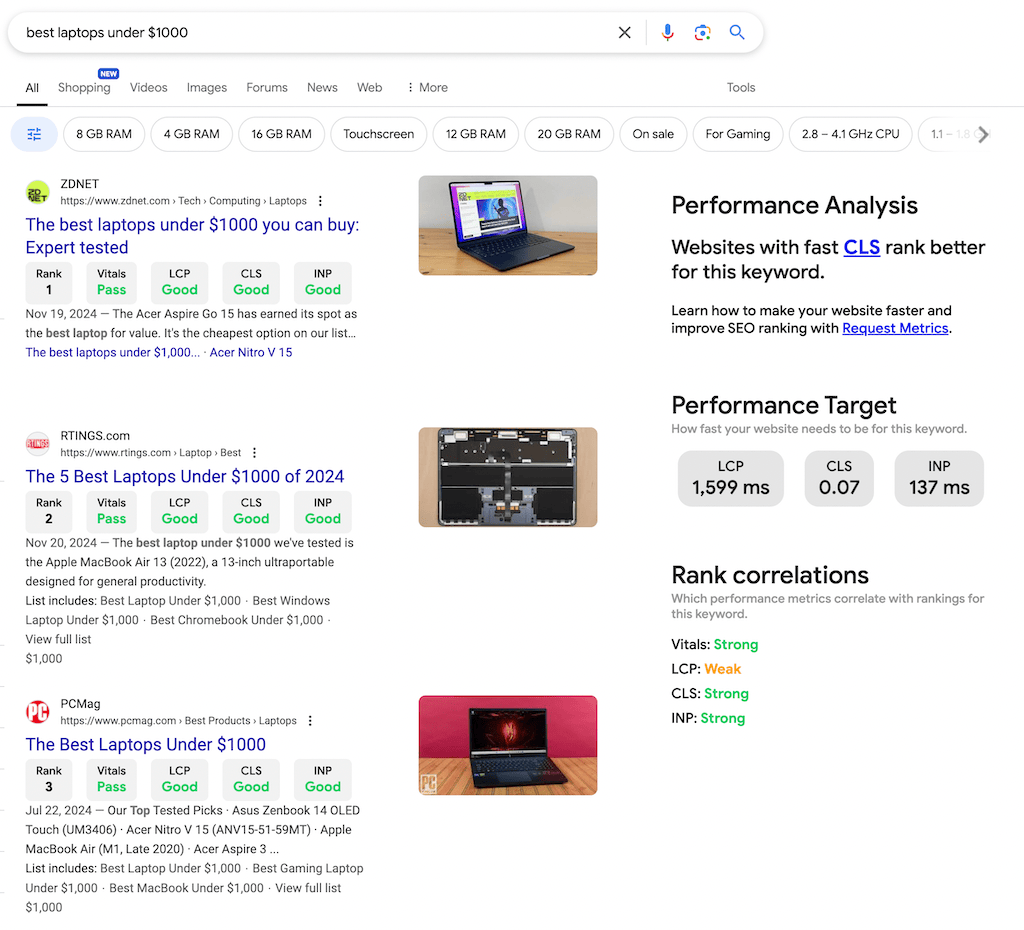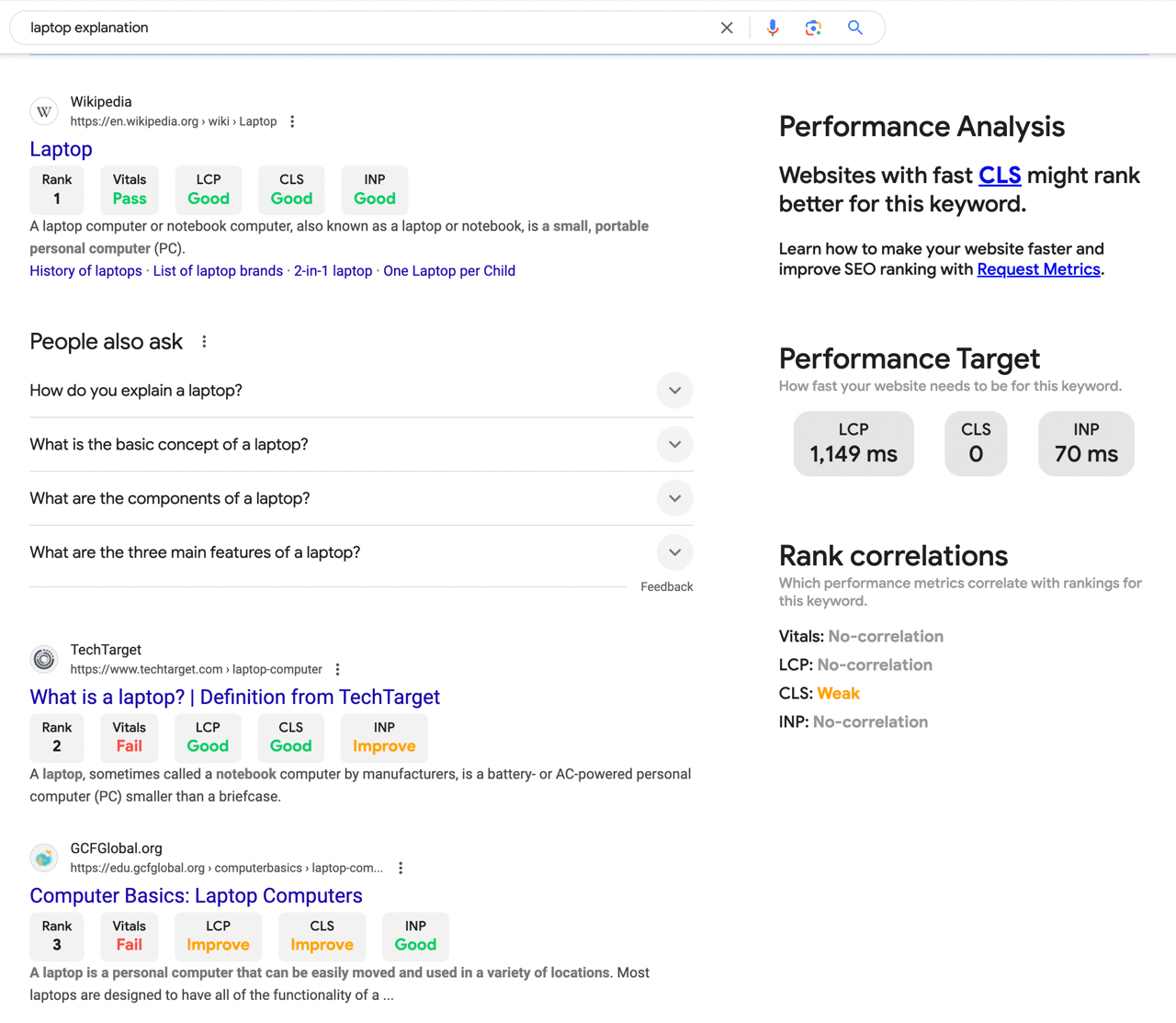 Todd Gardner is the co-founder of Request Metrics web performance monitoring. Find him on LinkedIn and BlueSky.
Todd Gardner is the co-founder of Request Metrics web performance monitoring. Find him on LinkedIn and BlueSky.The readers of this calendar know that web performance is important. A faster site means happier users, better conversion rates, and, according to Google, higher SEO rankings. But how much does performance actually affect your SEO?
It’s frustratingly unclear.
While Google says Core Web Vitals are a ranking factor, they don’t say how much weight they carry. Ironically, many web performance-related search results have failing Core Web Vital scores at the top of the page.
The reality is, web performance doesn’t impact SEO equally. The relationship depends on the specific keywords you’re targeting. For example, keywords like “Best Laptops” often show a strong correlation with performance—faster websites rank higher. On the other hand, keywords like “History of Laptops” have a weak correlation, meaning Google prioritizes content quality over speed.
This distinction matters. If your target keywords are performance-sensitive, investing in speed improvements can boost your rankings. But if they’re not, your time is better spent on content and relevance.
Guessing How Fast Is Fast Enough
For marketers and web performance professionals, this lack of clarity creates a frustrating challenge:
- How do you know when to prioritize web performance over other work?
- Which performance metrics (LCP, CLS, INP) actually impact rankings and user experience?
- When is the website fast enough?
Without clear data, we’re left guessing. You might pour hours (and budget) into improving web performance, only to see little to no impact on traffic or conversions. Or worse, you might neglect performance entirely for keywords where speed really matters.
Visualizing the SEO-Performance Connection
To address this problem, I created Keyword Vitals—a Chrome browser extension that adds data-driven clarity to the relationship between SEO rankings and web performance.
How Keyword Vitals Works
Keyword Vitals integrates directly with Google’s Search Results Pages (SERPs) and overlays real-world performance data (from the Chrome User Experience Report, or CrUX) onto each result. It displays the overall Core Web Vitals status and breaks down individual metrics: Largest Contentful Paint (LCP), Cumulative Layout Shift (CLS), and Interaction to Next Paint (INP).
But that’s just the start. Keyword Vitals analyzes how these performance metrics correlate with search rankings for your specific keyword.
When web performance matters, Keyword Vitals shows which metrics (like LCP, CLS, or INP) are most correlated with higher rankings. It also gives you the performance targets to hit so you can compete with the fastest pages.
But when it doesn’t matter, you’ll see that the top-ranking pages aren’t particularly fast. This insight helps you focus on improving content, relevance, or backlinks instead of chasing diminishing returns on performance optimization.
Real-World Examples
For example, I found that the keyword “best laptops under $1000” has a strong correlation with performance metrics—specifically, websites with faster CLS and INP scores rank higher.

But for “laptop explanation,” there’s no correlation between rank and performance, meaning Google emphasizes content quality over speed.

This insight helps you tailor your strategy:
- For “best laptops under $1000,” optimizing Core Web Vitals is essential to compete.
- For “laptop explanation,” your time is better spent creating in-depth, engaging content.
Conclusion
Web performance advice is often generic—”faster is better.” While true, this isn’t actionable or specific to your SEO goals. Keyword Vitals flips the script by providing real data about when and where performance matters.
When you need some data to help decide when your site is fast enough for your SEO strategy, try Keyword Vitals today. It’s free and pretty fun 😀.
